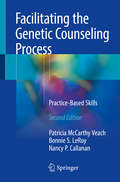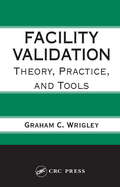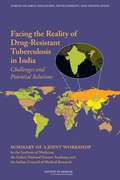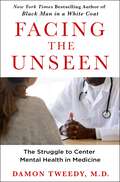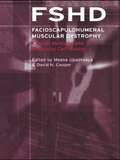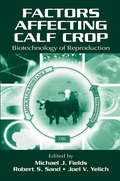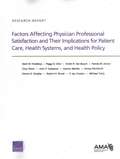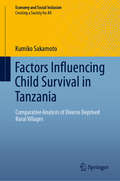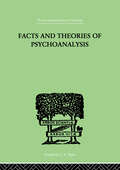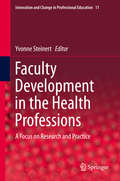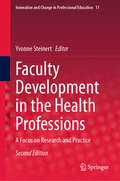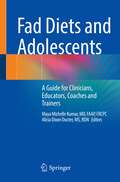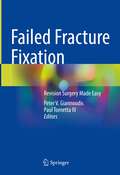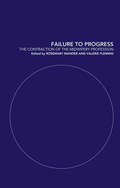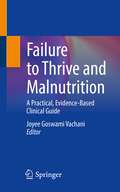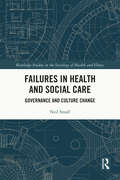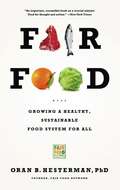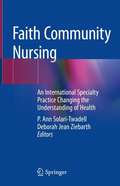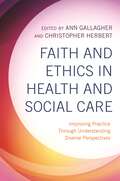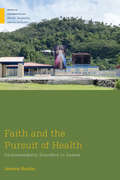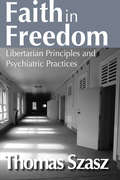- Table View
- List View
Facilitating the Genetic Counseling Process: A Practice Manual
by Patricia McCarthy Veach Bonnie S. LeRoy Nancy P. CallananDesigned as an aid to students in Genetics counseling classes and professionals interested in honing their skills, Facilitating the Genetic Counseling Process will guide the reader through the why's and how's of assisting clients with these complex issues. The authors' collective years of both teaching students and counseling clients is reflected in the clear, practical approach of this manual.
Facility Validation: Theory, Practice, and Tools
by Graham C. WrigleyOften considered a necessary evil by the pharmaceutical industry, validation is still understood by many as unrestrained bureaucracy, paperwork, and procedures whose roots and logic are obscure and only serve to slow down progress. Thoroughly defining the philosophy, application, and processes, Facility Validation: Theory, Practice, and Tools explo
Facing Eugenics
by Erika DyckFacing Eugenics is a social history of sexual sterilization operations in twentieth-century Canada. Looking at real-life experiences of men and women who, either coercively or voluntarily, participated in the largest legal eugenics program in Canada, it considers the impact of successive legal policies and medical practices on shaping our understanding of contemporary reproductive rights. The book also provides deep insights into the broader implications of medical experimentation, institutionalization, and health care in North America.Erika Dyck uses a range of historical evidence, including medical files, court testimony, and personal records to place mental health and intelligence at the centre of discussions regarding reproductive fitness. Examining acts of resistance alongside heavy-handed decisions to sterilize people considered "unfit," Facing Eugenics illuminates how reproductive rights fit into a broader discussion of what constitutes civil liberties, modern feminism, and contemporary psychiatric survivor and disability activism.
Facing the Reality of Drug-Resistant Tuberculosis
by Institute of Medicine Steve Olson Forum on Drug Discovery, Development, and Translation Anne B. Claiborne Board on Health Sciences Policy Rebecca A. English Rita S. GuentherAn estimated 8.8 million people fell ill with tuberculosis (TB) in 2010 and 1.4 million died from the disease. Although antibiotics to treat TB were developed in the 1950s and are effective against a majority of TB cases, resistance to these antibiotics has emerged over the years, resulting in the growing spread of multidrug-resistant (MDR) TB. Due to challenges in timely and accurate diagnosis of drug-resistant TB, length and tolerability of treatment regimens, and expense of second-line anti-TB drugs, effectively controlling the disease requires complex public health interventions. The IOM Forum on Drug Discovery, Development, and Translation held three international workshops to gather information from local experts around the world on the threat of drug resistant TB and how the challenges it presents can be met. Workshops were held in South Africa and Russia in 2010. The third workshop was held April 18-19, 2011, in New Delhi, India, in collaboration with the Indian National Science Academy and the Indian Council of Medical Research. The aim of the workshop was to highlight key challenges to controlling the spread of drug-resistant strains of TB in India and to discuss strategies for advancing and integrating local and international efforts to prevent and treat drug-resistant TB. This document summarizes the workshop.
Facing the Unseen: The Struggle to Center Mental Health in Medicine
by Damon TweedyFrom the New York Times bestselling author of Black Man in a White Coat comes a powerful and urgent call to center psychiatry and mental health care into the mainstream of medicineAs much as we all might wish that mental health problems, with their elusive causes and unsettling behaviors, simply did not exist, millions of people suffer from them, sometimes to an extreme extent. Many others face addiction to alcohol and other drugs, as overdose and suicide deaths abound. Yet the vast majority of doctors receive minimal instruction in treating these conditions during their lengthy medical training. This mismatch ignores the clear overlap between physical and mental distress, and too-often puts psychiatrists on the outside looking in as the medical system continues to fail many patients. In Facing The Unseen, bestselling author, professor of psychiatry, and practicing physician Damon Tweedy guides us through his days working in outpatient clinics, emergency rooms, and hospitals as he meets people from all walks of life who are grappling with physical and psychological illnesses. In powerful, compassionate, and eloquent prose, Tweedy argues for a more comprehensive and integrated approach where people with mental illness have a health care system that places their full well-being front and center.
Facioscapulohumeral Muscular Dystrophy (FSHD): Clinical Medicine and Molecular Cell Biology
by David Cooper Meena UpadhhyayaFacioscapulohumeral muscular dystrophy (FSHD) is a genetic disorder involving slowly progressive muscle degeneration in which the muscles of the face, shoulder blades and upper arms are among the most severely affected. It is the third most common inherited muscular dystrophy, affecting 1 in 20,000. The search for the molecular basis of the disease is of interest to all genetic researchers, involving a deletion outside a coding region resulting in over-expression of adjacent genes. This volume summarizes the current understanding of the disorder, including clinical, molecular and therapeutic aspects.
Fact and Prejudice: How to Communicate with Esoterics, Fanatics and Conspiracy Believers
by Holm Gero Hümmler Ulrike SchiesserWhen having coffee with your family, you are offered energized water. On Twitter you discuss with vaccination opponents. The WhatsApp kitagroup discusses zodiac signs, the pharmacy sells you globules, the neighbor proselytizes for her guru, and the news is once again about demonstrations by right-wing extremists.Everywhere you encounter conspiracy myths, superstition, esotericism, pseudoscience and Co. and you want to respond to them - while remaining as factual as possible, clarify your position, provide facts, but also not unnecessarily provoke or overload. In addition, you do not want to hurt your counterpart, but to encourage him to rethink. But how do you do that?If you are asking yourself this question, read "Fact and Prejudice". Understand why we are driven by emotions and most information bounces off us. Read experiences and tips from interviews with professional (science) communicators. Then follow different people through their own rethinking processes: What convinces an alternative medicine practitioner to leave non-evidence-based medicine behind? What was the deciding factor for a former vaccination opponent to have her children vaccinated after all? What helps members of appropriative organizations to get out? What moves a celebrated medium to break away from esotericism?This book is for anyone who worries about or doesn't know how to communicate with people who have irrational worldviews - whether it's with family, friends, anonymously on the Internet, or at work. The authors give concrete tips on discussions and situations and also help to decide when it is important to engage and when it is better to withdraw.
Factor VIII - von WIllebrand Factor, Volume I
by M. J. Seghatchian G. F. SavidgeThis book extensively reviews the purification and structure/function relationships of Factor VIII - von Willebrand Factor with the relevance of advances in the areas of biochemical, methodological and functional aspects to improved methodology and biotechnology.
Factors Affecting Calf Crop: Biotechnology of Reproduction
by Michael J. Fields Robert S. Sand Joel V. YelichIn today's world, we are witnessing simultaneous breakthroughs in reproductive technologies, genomics, and molecular biology. Advances in molecular genetic technology and understanding of the bovine genome have led to the development of tools that can be used to enhance profitability on cow-calf enterprises. Factors Affecting Calf Crop: Biotechnolo
Factors Affecting Physician Professional Satisfaction and Their Implications for Patient Care, Health Systems, and Health Policy
by Soeren Mattke Kristin R. Van Busum Mark W. Friedberg Peggy G. Chen Frances M. Aunon Chau Pham John P. Caloyeras Emma Pitchforth Denise D. Quigley Robert H. BrookThe American Medical Association asked RAND Health to characterize the factors that affect physician professional satisfaction. RAND researchers sought to identify high-priority determinants of professional satisfaction by gathering data from 30 physician practices in six states, using a combination of surveys and semistructured interviews. This report presents the results of the subsequent analysis.
Factors Influencing Child Survival in Tanzania: Comparative Analysis of Diverse Deprived Rural Villages (Economy and Social Inclusion)
by Kumiko SakamotoThis book addresses the essential topic of child survival in Tanzania, especially focusing on the role of mutual assistance, which has received little attention to date. Further, it identifies a range of key factors for child survival by combining a literature review, regional data analysis, and case studies. These studies center on rural villages in high Under-5 mortality rate (U5MR) regions and assess their strengths and weaknesses regarding child survival. By focusing on deprived rural areas as of 2002 and evaluating the improvements in the 2012 census data, the book also highlights the potential held by rural semi -subsistence economies. An analysis of the focus villages indicates that children in food-sharing circles had better chances of survival. However, food sharing is not necessarily inclusive; a significant number of children have fallen out of such circles, especially in mainland villages. Furthermore, monetary support for children’s medicine has often failed to arrive in time. Lastly, the book argues that, in addition to direct factors such as access to health services, water and sanitation, food intake, and education, it is essential that children receive inclusive support at various levels: family, community, village, national, and international.
Facts And Theories Of Psychoanalysis (International Library Of Psychology Ser.)
by Hendrick, IvesFirst Published in 1999. Routledge is an imprint of Taylor & Francis, an informa company.
Faculty Development in the Health Professions
by Yvonne SteinertThis volume addresses all facets of faculty development, including academic and career development, teaching improvement, research capacity building, and leadership development. In addition, it describes a multitude of ways, ranging from workshops to the workplace, in which health professionals can develop their knowledge and skills. By providing an informed and scholarly overview of faculty development, and by describing original content that has not been previously published, this book helps to ensure that research and evidence inform practice, moves the scholarly agenda forward, and promotes dialogue and debate in this evolving field. It will prove an invaluable resource for faculty development program planning, implementation and evaluation, and will help to sustain faculty members' vitality and commitment to excellence. Kelley M. Skeff, M. D. , Ph. D. , May 2013: In this text, Steinert and her colleagues have provided a significant contribution to the future of faculty development. In an academic and comprehensive way, the authors have both documented past efforts in faculty development as well as provided guidance and stimuli for the future. The scholarly and well-referenced chapters provide a compendium of methods previously used while emphasizing the expanding areas deserving work. Moreover, the writers consistently elucidate the faculty development process by highlighting the theoretical underpinnings of faculty development and the research conducted. Thus, the book provides an important resource for two major groups, current providers and researchers in faculty development as well as those desiring to enter the field. Both groups of readers can benefit from a reading of the entire book or by delving into their major area of interest and passion. In so doing, they will better understand our successes and our limitations in this emerging field. Faculty development in the health professions has now received attention for 6 decades. Yet, dedicated faculty members trying to address the challenges in medical education and the health care delivery system do not have all the assistance they need to achieve their goals. This book provides a valuable resource towards that end.
Faculty Development in the Health Professions: A Focus on Research and Practice (Innovation and Change in Professional Education #11)
by Yvonne SteinertThis second edition of 'Faculty Development in the Health Professions', originally published in 2014, presents updated chapters and new topics. It also highlights changes in the evidence base for faculty development and identifies recommendations for research and practice in the field. With chapter authors coming from five continents, it builds on and presents global lessons learned for an international audience. This book describes a multitude of ways, ranging from workshops to the workplace, in which health professionals can develop their knowledge and skills as teachers and educators, leaders and managers, and researchers and scholars. By providing an informed and scholarly overview of faculty development, and by describing original content that has not been previously published, this book helps to ensure that research and evidence inform practice, move the scholarly agenda forward, and promote dialogue and debate in this evolving field. It serves as an invaluable resource for faculty development program planning, implementation and evaluation, and helps to sustain faculty members’ vitality and commitment to excellence.
Fad Diets and Adolescents: A Guide for Clinicians, Educators, Coaches and Trainers
by Alicia Dixon Docter Maya Michelle KumarFad diets have influenced our society for hundreds of years. While they are heterogeneous in nature, they make many of the same promises: weight loss, fat burning, muscle building, flatter stomachs, improved gut health, clearer skin, and protection of animal rights and the environment. Not only are fad diets usually ineffective, they are often highly restrictive and associated with significant health risks. Furthermore, the practice of fad dieting dramatically increases one’s risk of developing malnutrition and/or an eating disorder. Adolescence is a period of rapid physical and socioemotional growth during which young people become more vulnerable to poor body image and low self-esteem, which may make adolescents particularly likely to adopt fad diets. However, the nutritional risk incurred could result in serious and potentially permanent impairment of physical and psychosocial development. This book provides an overview of fad diets through the ages, highlighting what all fad diets have in common and how to recognize a fad diet. Readers will learn what science tells us about nutritional needs during adolescence for normal physical, cognitive, and socioemotional development, and the risks that may be incurred if a fad diet prevents an adolescent from meeting these needs. This book examines why adolescents may be particularly prone to fad dieting and why they may also have more to lose if they adopt them. Readers will explore factors that shape adolescent diet culture. This book makes specific recommendations for caring adults in the lives of adolescents, including interdisciplinary health care providers, teachers, coaches, trainers, parents and other caregivers, to steer adolescents away from fad diets and towards healthier alternatives for achieving their goals. The initial chapters are didactic chapters that outline core material. Subsequent chapters use illustrative case examples to teach the reader how to screen adolescents for fad dieting, listen to the concerns that attracted them to the diet, engage them in a discussion about their goals, and collaborate with them to find a healthier path. All chapters conclude with discussion questions for further reflection.
Faded Genes: Searching for a Cure and Finding Home in Altamura, Italy
by Patrick GirondiA 47-year-old Pittsburgh insurance man and his busted nightclub-singing friend go to Italy in the hopes of finding a bone marrow donor. Danny&’s life was mundanely ordinary. He sold insurance in the small neighborhood of Fineview overlooking Pittsburgh. His weekdays ended watching all-star wrestling with his mother, and his weekends were spent in bars with PatG, a broken-down crooner and Kevin, a professional drinker and a sage. Danny is diagnosed with a flash leukemia. There were no transplant matches and little hope. Danny's mother confesses that to avoid deportation, his biological father had taken off for Italy before he was born. Papà has no idea that he has a son. Danny heads off for southern Italy with PatG. PatG&’s Italian is worse than his voice. It all makes for a compelling situation in which cultural lines are drawn and broken.
Failed Fracture Fixation: Revision Surgery Made Easy
by Peter V. Giannoudis Paul Tornetta IIIThis first edition text book describes applicable step-wise approaches to successfully manage patients with failed fracture fixation. Cases are presented for a range of anatomical sites focusing on the aetiology of the failure, clinical examination along with the necessary investigations required for the initial patient assessment, pre-operative planning and its successful execution. Emphasis is placed on detailing when the timing of an intervention is required. A "tips and tricks" section is provided in each chapter enabling the reader to familiarize themselves with potential pitfalls associated with each technique covered and further develop their understanding of the content covered.Failed Fracture Fixation: Revision Surgery Made Easy is a comprehensive practically applicable guide to understand the aetiology of failure and to become familiar on how to use a range of relevant surgical techniques in a variety of anatomical sites to provide the patient with optimum conditions for a successful clinical and functional outcome. Therefore, it is an essential resource for trainee and practicing orthopedic surgeons seeking up-to-date guidance on how to apply the latest methodologies into their daily practice.
Failure to Progress: The Contraction of the Midwifery Profession
by Rosemary Mander Valerie FlemingChanges in the field of midwifery are of concern to those within the health care system, the academic world and those whose lives are touched by midwifery care. This text reflects on the current situation and questions whether it is the most appropriate way of providing care for the childbearing woman. The book discusses what is happening both within midwifery as well as to midwifery as a profession in the context of social change. Topics covered include:* the evolution of the midwifes role* women's issues* the functioning of the midwife within the health care system* the effects of organisational change* the relationships of the midwife with the woman she cares for and with medical practitioners.All of the contributors to Failure to Progress are actively involved with the provision of care to the childbearing woman, and most are practising midwives. Together they build up a comprehensive picture of midwifery today which will be relevant to all midwifery students, practitioners and policy makers and not least to the consumers of midwifery care.
Failure to Thrive and Malnutrition: A Practical, Evidence-Based Clinical Guide
by Joyee Goswami VachaniFailure to Thrive (FTT) is a multifactorial illness requiring the systematic application of evidence in conjunction with a multidisciplinary team-based approach. Evidence suggests most cases of FTT can be diagnosed using key elements of the patient history and physical examination including appropriate growth assessment, and that laboratory testing is usually unhelpful in determining an etiology. Despite this, there is wide variation in the definition, evaluation, treatment, costs, and outcomes of FTT patients, with subsequent burdens on the healthcare system. A suggested approach to the differential diagnosis and management of FTT is to review calories – inadequate caloric intake, excessive calorie losses, and/or increased caloric intake (i.e. increased metabolic demand) – while acknowledging the available resources along the continuum of patient care. Implementing evidence-based practice for FTT provides improvement opportunities for providers and potentially has significant impact on the healthcare system. This book is designed to present a practical and concise handbook on the diagnosis and management of failure to thrive (FTT)/ malnutrition for quick reference by trainees and practitioners by using case examples and available evidence in the current literature. This book is divided into 7 chapters in a logical progression of defining, diagnosing, and managing FTT with cases in each chapter to further illustrate evidence-based care.
Failures in Health and Social Care: Governance and Culture Change
by Neil SmallThis thought-provoking book examines breakdowns in the quality of health and social care over the past decade, exploring governance failures and the challenges of achieving lasting change. Failures in care have been manifest across many different settings. Drawing on examples from care of older people and end-of-life care, as well as from learning disabilities, mental health, maternity care and services for vulnerable children, Neil Small shows that the same sorts of problems are evident across these settings and that they are occurring up to the present day. Discussing culture change alongside levels of funding and the impact of prevailing political and economic orthodoxies, and through the lens of shifts of trust in society, this book argues that the concept of culture must be cast much wider than organisational and professional cultures if change is to be secured. This book engages with how to improve quality of care in the NHS and welfare systems more generally. Its case examples are from the UK but the issues of governance, culture change and shifts in the social contract that failures illuminate have an international relevance. It is important reading for those with an interest in health, social care, political science, and sociology.
Fair Food: Growing a Healthy, Sustainable Food System for All
by Oran HestermanOur food system is broken, and it’s endangering what’s most precious to us: our environment, our health, our soil and water, and our future. In recent years, a host of books and films have compellingly documented the dangers. But advice on what to do about them largely begins and ends with the admonition to "eat local” or "eat organic. ” Longtime good food pioneer Oran Hesterman knows that we can’t fix the broken system simply by changing what’s on our own plates: the answer lies beyond the kitchen. InFair Foodhe shares an inspiring and practical vision for changing not only what we eat, but how food is grown, packaged, delivered, marketed, and sold. He introduces people and organizations across the country who are already doing this work in a number of creative ways, and provides a wealth of practical information for readers who want to get more involved.
Faith Community Nursing: An International Specialty Practice Changing the Understanding of Health
by P. Ann Solari-Twadell Deborah Jean ZiebarthA multi-authored book, with editors and authors who are leaders in Faith Community Nursing (FCN) that aims to address contemporary issues in faith-based, whole person, community based health offering cost effective, accessible, patient centered care along the patient continuum while challenging contemporary health policy to include more health promotion services. Twenty-five chapters take the reader from a foundational understanding of this historic grass-roots movement to the present day international specialty nursing practice. The book is structured into five sections that describe both the historical advancement of the Faith Community Nursing, its current implications and future challenges, taking into account the perspectives of the pastor, congregation, nurse, health care system and public health national and international organizations. The benefits of this book are that it is intended for a mixed audience including lay, academic, medical professionals or health care executives. By changing the mindset of the reader to see the nurse as more than providing illness care, the faith community as more than a place one goes to on Sunday and health as more than physical, creative alternatives for promoting health emerge through Faith Community Nursing.
Faith and Ethics in Health and Social Care: Improving Practice Through Understanding Diverse Perspectives
by Ann Gallagher Christopher HerbertThis textbook looks at how different world faiths approach ethics in health and social care, and how their faith informs their practice. Equipping practitioners with the information the need, it will support them to be more reflective regarding spirituality, ethics and their provision of care.
Faith and the Pursuit of Health: Cardiometabolic Disorders in Samoa (Medical Anthropology)
by Jessica HardinFaith and the Pursuit of Health explores how Pentecostal Christians manage chronic illness in ways that sheds light on health disparities and social suffering in Samoa, a place where rates of obesity and related cardiometabolic disorders have reached population-wide levels. Pentecostals grapple with how to maintain the health of their congregants in an environment that fosters cardiometabolic disorders. They find ways to manage these forms of sickness and inequality through their churches and the friendships developed within these institutions. Examining how Pentecostal Christianity provides many Samoans with tools to manage day-to-day issues around health and sickness, Jessica Hardin argues for understanding the synergies between how Christianity and biomedicine practice chronicity.
Faith in Freedom: Libertarian Principles and Psychiatric Practices
by Thomas SzaszThe libertarian philosophy of freedom is characterized by two fundamental beliefs: the right to be left alone and the duty to leave others alone. Psychiatric practice routinely violates both of these beliefs. It is based on the notion that self-ownership—exemplified by suicide—is a not an inherent right, but a privilege subject to the review of psychiatrists as representatives of society. In Faith in Freedom, Thomas Szasz raises fundamental questions about psychiatric practices that inhibit an individual's right to freedom.His questions are fundamental. Is suicide an exercise of rightful self-ownership or a manifestation of mental disorder? Does involuntary confinement under psychiatric auspices constitute unjust imprisonment, or is it therapeutically justified hospitalization? Should forced psychiatric drugging be interpreted as assault and battery on the person or is it medical treatment?The ethical standards of psychiatric practice mandate that psychiatrists employ coercion. Forgoing such "intervention" is considered a dereliction of the psychiatrists' "duty to protect." How should friends of freedom—especially libertarians—deal with the conflict between elementary libertarian principles and prevailing psychiatric practices? In Faith in Freedom, Thomas Szasz addresses this question more directly and more profoundly than in any of his previous works.
